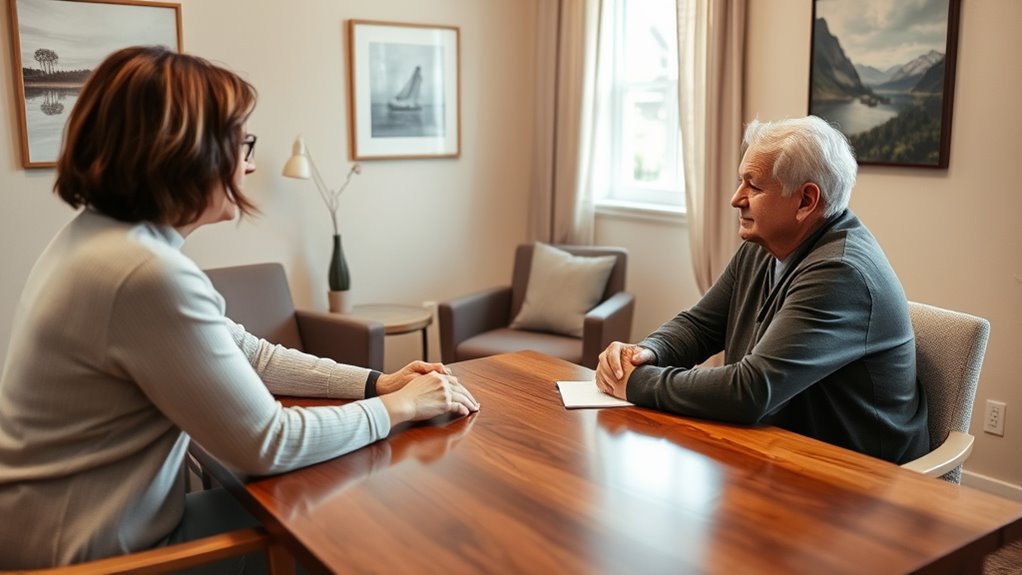When steering marriage counseling after an affair, you can expect a focus on rebuilding trust through honest conversations and transparency. The counselor will guide you in discussing what happened, setting clear boundaries, and improving communication. You’ll work on creating emotional safety and understanding each other’s needs. It’s a process that takes time and patience, but with consistent effort, you’ll move toward a healthier relationship. If you want to know what steps come next, keep exploring.
Key Takeaways
- Expect honest discussions about the affair, guided by the counselor to promote transparency and emotional healing.
- Focus on rebuilding trust through consistent actions, accountability, and establishing new boundaries.
- Engage in communication exercises that enhance openness, empathy, and understanding of each other’s feelings.
- Participate in activities designed to restore emotional safety and mutual support during the healing process.
- Understand that trust rebuilding takes time, patience, and ongoing effort from both partners.

Discovering an affair can feel devastating, but it doesn’t have to mean the end of your relationship. When you decide to pursue marriage counseling, you’re taking a significant step toward healing and moving forward. One of the primary focuses during counseling will be trust rebuilding. Trust, once broken, takes time and consistent effort to restore. Your counselor will guide you through exercises and conversations designed to foster honesty and transparency, helping both of you understand what led to the breach and how to prevent it from happening again. This process isn’t about blame but about creating a foundation of accountability that can support renewed trust.
Rebuilding trust after an affair requires patience, honesty, and mutual effort guided by professional support.
Alongside trust rebuilding, communication improvement plays an essential role. Affairs often reveal underlying issues with how you and your partner communicate. During counseling sessions, you’ll learn to express your feelings more openly and listen with empathy. Your counselor will encourage you to share your thoughts without judgment and to validate each other’s emotions, which can help you reconnect on a deeper level. As you develop these skills, you’ll find it easier to discuss sensitive topics, including fears, needs, and expectations. Improved communication helps prevent misunderstandings and creates a safe space where both of you feel heard and respected.
The counseling process will likely involve honest discussions about the affair itself—what happened, why it happened, and how you both feel about it now. Your counselor will facilitate these conversations, ensuring they stay productive and respectful. This transparency is essential for rebuilding trust and healing emotional wounds. It’s normal to experience discomfort during these talks, but with guidance, you’ll learn to navigate difficult feelings without becoming defensive or shutting down.
Expect to work on establishing new boundaries and commitments, which are fundamental for moving forward. These agreements can include increased honesty about whereabouts, transparency with phone or social media use, and regular check-ins about your relationship’s health. Your counselor will help you identify what boundaries are necessary for your unique situation and how to uphold them.
Additionally, understanding the importance of secure attachment can enhance your healing process by fostering emotional safety and mutual support. Ultimately, marriage counseling after an affair is about creating a new, healthier dynamic. You’ll learn to rebuild trust gradually through consistent actions and improved communication. It’s a process that requires patience, effort, and mutual commitment, but with professional guidance, you can emerge stronger and more connected than before. Remember, healing isn’t about erasing the past but about learning from it and creating a future rooted in honesty, respect, and shared understanding.
Frequently Asked Questions
How Long Does Marriage Counseling Typically Last After an Affair?
Marriage counseling after an affair can last anywhere from a few months to over a year, depending on your progress. During this time, you’ll work on emotional healing and improving communication skills to rebuild trust. You might see quicker progress with commitment and openness, but it’s normal for healing to take time. Stay patient and consistent, and your counselor will guide you through each stage of recovery.
Can Couples Fully Recover From Infidelity Through Counseling?
Yes, couples can fully recover from infidelity through counseling, but trust rebuilding and emotional healing are essential. You must commit to honest communication, patience, and consistent effort. While healing takes time, focusing on these key areas helps restore your relationship. With dedication, you can overcome betrayal, rebuild trust, and create a stronger, more resilient partnership. Remember, recovery is possible when both partners are willing to work through the pain together.
What Are the Signs That Counseling Is Working?
You’ll notice counseling is working when you see emotional healing happening, like increased trust and understanding. Improved communication is also a key sign, as you and your partner start sharing feelings openly and listening actively. If conflicts become easier to resolve and you both feel more connected, it indicates progress. These signs show that your efforts are fostering growth and rebuilding your relationship after the affair.
Is Individual Therapy Recommended Alongside Couples Counseling?
Think of your healing journey as tending a garden; individual therapy acts like nurturing each plant’s roots. It’s highly recommended alongside couples counseling because it provides emotional support and helps you develop better communication skills. This personal space allows you to explore feelings, address personal issues, and strengthen your resilience. Together, these therapies create a stronger foundation for rebuilding trust and intimacy in your relationship.
How Do I Rebuild Trust After an Affair?
You start by committing to the forgiveness process, which allows emotional rebuilding to take place. Be honest about your feelings and set clear boundaries. Focus on open communication and show consistency in your actions. Trust rebuilds gradually through patience and transparency. Remember, healing takes time, but staying dedicated to these steps helps restore trust and strengthens your relationship in the long run.
Conclusion
Guiding marriage counseling after an affair can feel like steering through a storm, but with patience and honesty, calmer waters are possible. Remember, rebuilding trust is a gradual process—think of it as planting seeds that need time to grow. Stay committed, communicate openly, and don’t rush the healing. Soon enough, you’ll find your relationship blossoming again, stronger than ever, like a resilient tree standing tall after a storm.









